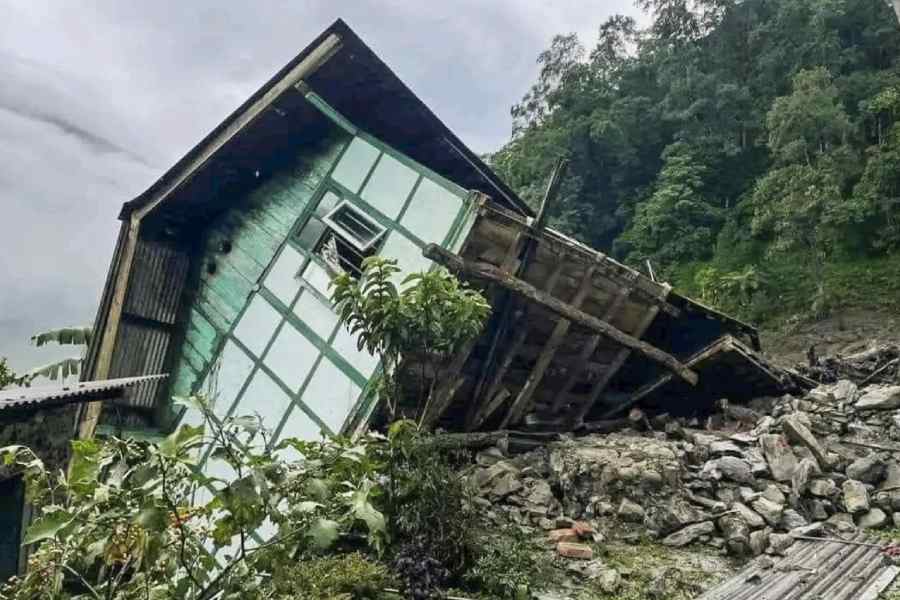Flash floods and landslides hit north Sikkim on Wednesday night, killing six people, damaging roads and bridges and leaving around 1,000 tourists stranded in tourism hotspots like Lachung, Yumthang and Dikchu.
Vast areas of Mangan district, which covers the whole of north Sikkim, are cut off from the rest of the country, with power supply too snapped and telecommunication networks affected. The flash floods in the Teesta and local streams have washed away dozens of houses.
“The principal road that connects Mangan town (the district headquarters) with destinations like Lachung and Yumthang has been damaged. Also, a bridge over the Teesta that was built after last year’s flash floods has been washed away,” a district official in Mangan said.
“Our priority is to restore road connectivity and reinstate the communication network, and then gradually evacuate all those stranded in north Sikkim.”
Asked whether the government had started a helpline, the official said it had not as it had been unable to collate data on the stranded tourists because of the disaster’s impact on the telecom network.
Last year’s flash floods in the Teesta, triggered by a glacial lake burst in north Sikkim, had left roads and bridges extensively damaged across the mountain state. The Sikkim government had then restricted tourist movement to Mangan district.
In December, the Lachung-Yumthang axis was reopened to tourists but Lachen, which leads to the famous Gurudongmar Lake, remains closed even now.
Multiple sources in the Sikkim government said the situation remained volatile as it had rained heavily over the past four or five days across the state. It rained over 200mm in Mangan during the past 24 hours. However, they said, the situation was not — at least till now — as grave as last October’s.
“So far, the damage is mostly in north Sikkim. Last time, the flash floods had damaged many other areas in the south and east of the state too,” an official said.
Kalpak De, who runs a hotel in Lachung, said the tourists were safe in their hotels.
“We hope the situation will improve soon. But they are unable to contact their families and friends because of problems with cell phone connectivity,” De said.
Around 35 tourists — from Bengal, Rajasthan and elsewhere — are stranded in De’s hotel.
A Siliguri-based hotelier who runs a hotel in Lachung said a group of tourists had set off for Gangtok and other destinations from Lachung on Thursday morning.
“But they had to return as the road to Mangan and a bridge over the Teesta have been swept away,” he said.
“Another group of tourists who were supposed to reach Lachung today (Thursday) had to cancel their trip. Cell phone connectivity is so poor that I find it tough to communicate even with my staff at the hotel.”
Along with the tourists, over 100 vehicles are stuck at various places in Mangan.
“There are reports about tourists being stranded at homestays in places like Dzongu, which is in Mangan,” a source said.
With a bridge on the main route connecting Lachung to Mangan town damaged, local people have started building log bridges. In October last year, choppers were engaged to evacuate tourists.
“We have learnt from last year’s disaster and are better prepared now. As road connectivity has snapped, we have initiated the process to make footbridges with logs of wood,” a senior state government official said.
“These bridges can be used for the movement of people and essential goods till the damaged stretches are repaired for vehicles to ply.”
More rainfall has been forecast in Sikkim over the next couple of days. “If it rains further, it would take time to restore road connectivity,” the official said.
Debasish Chakraborty, general secretary of the Eastern Himalaya Travel and Tour Operators’ Association, said the organisation was in touch with the Sikkim government and the Mangan administration.
“We are exploring all options to ensure that the stranded tourists return home safely,” Chakraborty said in Siliguri.
“Also, those who had planned to visit north Sikkim during the next couple of weeks have been informed about the disaster and asked to revise their itineraries and visit other destinations.”










